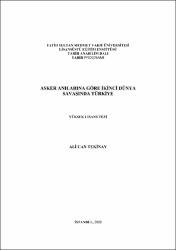| dc.contributor.advisor | Saygılı, Hasip | |
| dc.contributor.author | Tekinay, Ali Can | |
| dc.date.accessioned | 2020-08-28T08:50:12Z | |
| dc.date.available | 2020-08-28T08:50:12Z | |
| dc.date.issued | 2020 | en_US |
| dc.identifier.citation | TEKİNAY, Ali Can, Asker Anılarına Göre İkinci Dünya Savaşında Türkiye, Fatih Sultan Mehmet Vakıf Üniversitesi Lisansüstü Eğitim Enstitüsü Tarih Anabilim Dalı, Yayımlanmamış Yüksek Lisans Tezi, İstanbul 2020. | en_US |
| dc.identifier.uri | https://hdl.handle.net/11352/3129 | |
| dc.description.abstract | Birinci Dünya Savaşı’ndan sonra 1939 yılında İkinci Dünya Savaşı adıyla tarihin en kanlı savaşı yaşanmış ve bu olay 1945’e kadar devam etmiştir. Altı yıllık süre zarfında savaşta gel-gitler olmuştur. 1939-1941 yılları Mihver devletlerinin ilerleyişiyle geçmiştir. 1942’den itibaren ise Müttefikler denge kurmayı başarmıştır. 1943 sonundan itibaren Mihver ülkelerinin çöküşü hızlanmıştır. En sonunda 1945 Ağustos’unda Japonya’nın teslim olmasıyla savaş sona ermiştir.
Türkiye, savaşa katılmamayı ve tarafsız kalmayı tercih etmiştir. Ancak, buna rağmen ülke savaş atmosferinden uzak tutulamamıştır. Dönem boyunca İsmet İnönü ve Mareşal Fevzi Çakmak, her an savaşa dahil olacakmış gibi ordu ve millet üzerinde hazırlıklarını sürdürmüşlerdir. Tarafsızlık politikası çerçevesinde atılan adımların halk ve ordu içerisindeki etkileri ağır olmuştur.
Bu çalışmada, 1939-1945 arası genel dünya tarihiyle beraber İkinci Dünya Savaşı’nın Türkiye’ye ekonomik-siyasi-askeri etkileri anlatılmış ve tüm bunlar asker anıları ile desteklenmeye çalışılmıştır. Böylece resmi anlatıların dışında, asker anıları sayesinde kenarda köşede kalan uç örneklere ulaşılarak savaşın tesirleri tüm gerçekliğiyle ortaya konulmaya çalışılmıştır. | en_US |
| dc.description.abstract | After the First World War, the bloodiest war in history took place in 1939 under the name of the Second World War and this event continued until 1945. During the six-year period there were tides in the war. The years 1939-1941 passed through with the progress of the Axis Powers. However, by 1942, the Allies have managed to establish the balance. By the end of 1943, the collapse of the Axis countries has accelerated. Finally, in August 1945, the war ended with the surrender of Japan.
Turkey has preferred to remain neutral and not participate in the war. However, despite this decision, the country could not kept itself away from the atmosphere of war. During the annoying period, İsmet İnönü and Marshal Fevzi Çakmak continued their preparations on the army and the nation, as if they would be involved in the war at any time. Obviously, the steps taken within the framework of the policy of impartiality have had a heavy impact on the public and the military.
In this study, together with the general world history between 1939-1945, the economic-political-military influences of World War II on Turkey have been described and all these have been tried to be supported with soldier memories. Thus, apart from the official narratives, the effects of the war were tried to be revealed in all its reality by reaching the extreme examples left hidden in the corner at the edge thanks to the memories of the soldiers. | en_US |
| dc.language.iso | tur | en_US |
| dc.publisher | Fatih Sultan Mehmet Vakıf Üniversitesi, Lisansüstü Eğitim Enstitüsü | en_US |
| dc.rights | info:eu-repo/semantics/openAccess | en_US |
| dc.subject | İkinci Dünya Savaşı | en_US |
| dc.subject | Türkiye | en_US |
| dc.subject | Ordu | en_US |
| dc.subject | Subay | en_US |
| dc.subject | Asker Anıları | en_US |
| dc.subject | Second World War | en_US |
| dc.subject | Turkey | en_US |
| dc.subject | Army | en_US |
| dc.subject | Officer | en_US |
| dc.subject | Soldier Memoirs | en_US |
| dc.title | Asker Anılarına Göre İkinci Dünya Savaşında Türkiye | en_US |
| dc.title.alternative | Turkey in the Second World War According to the Memoirs of Sodiers | en_US |
| dc.type | masterThesis | en_US |
| dc.contributor.department | FSM Vakıf Üniversitesi, Lisansüstü Eğitim Enstitüsü | en_US |
| dc.relation.publicationcategory | Tez | en_US |
| dc.contributor.institutionauthor | Tekinay, Ali Can | |



















